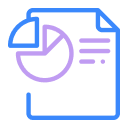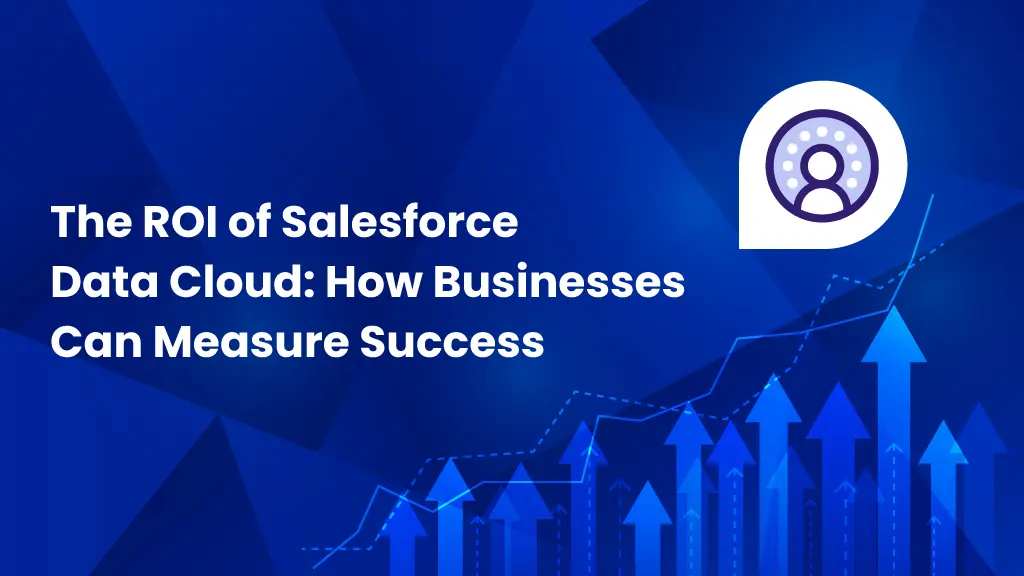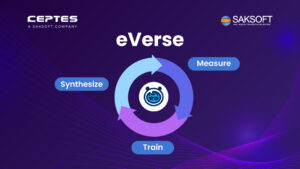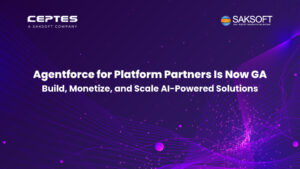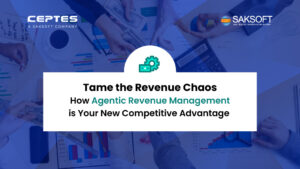What is Salesforce Data Cloud?
Salesforce Data Cloud—formerly known as Customer Data Platform (CDP)—aggregates data from disparate sources like CRM systems, e-commerce platforms, web analytics, mobile apps, and social media. It creates a unified, dynamic 360-degree customer profile, enabling personalized, contextual customer experiences and providing data cloud analytics across all digital and offline touchpoints.
This real-time data harmonization drives enhanced customer engagement, faster decision-making, and measurable business outcomes.
Why Use Salesforce Data Cloud?
In an era where personalization and real-time responsiveness dictate customer loyalty, Salesforce Data Cloud stands out as a game-changing solution. But what makes it so essential for modern enterprises?
1. Unified View of the Customer
Traditional data systems often store customer data in silos—marketing data in one platform, sales in another, service in a third. This fragmentation leads to disjointed customer experiences.
Salesforce Data Cloud unifies this data across all touchpoints—email, web, mobile, CRM, support, and even offline interactions—into a real-time customer graph. This 360-degree view allows businesses to engage with customers in a more meaningful and consistent way.
2. Real-Time Data Activation
Modern consumers expect instant gratification. Salesforce Data Cloud empowers businesses to process and activate data in real time. This enables marketers to launch timely and contextual campaigns, sales teams to adjust pitches on the fly, and service reps to solve problems with full context.
Use case: A retail brand can trigger a product discount SMS the moment a customer abandons a cart—not hours or days later.
3. AI-Powered Intelligence and Decision-Making
Data Cloud integrates seamlessly with Salesforce Einstein AI, allowing businesses to move from reactive analytics to proactive decision-making. From next-best-action recommendations to AI-driven segmentation, businesses can unlock smarter and faster insights that directly impact revenue and retention.
4. Data Governance, Privacy, and Compliance
Data Cloud comes with robust built-in tools for data governance, including consent management, data lineage, and audit trails. With increasing regulatory pressures (like GDPR, CCPA), businesses need platforms that ensure compliance without compromising agility.
This is especially critical in regulated industries like healthcare, finance, and telecom.
5. Seamless Integration with the Salesforce Ecosystem
Data Cloud is natively integrated with the broader Salesforce ecosystem, including:
- Sales Cloud for smarter prospecting
- Service Cloud for contextual support
- Marketing Cloud for hyper-personalized journeys
- Commerce Cloud for intelligent product recommendations
Key Reasons to Use Salesforce Data Cloud
| Feature | Benefit |
|---|---|
| Real-time data unification | 360° customer profiles |
| Native AI & analytics | Predictive insights & actions |
| Activation across Salesforce apps | Faster execution across sales, service, and marketing |
| Privacy-ready architecture | GDPR/CCPA compliance built-in |
| Scalable infrastructure | Enterprise-grade performance |
Measuring the ROI of Salesforce Data Cloud
Implementing Salesforce Data Cloud can lead to significant improvements across multiple business dimensions. Organizations can measure Salesforce ROI across three key areas,
Here’s how:
1. Revenue Growth
- Enhanced Personalization: Personalized marketing campaigns can lead to a 5-15% increase in revenue and a 10-30% uplift in marketing ROI.
- Improved Conversion Rates: Businesses have reported a 15-25% increase in marketing campaign conversion rates post-implementation.
2. Operational Efficiency
- Reduced Manual Processes: Automation of data processing and quality controls minimizes manual tasks, leading to faster time-to-market and decreased resource requirements.
- Real-Time Insights: Access to up-to-the-minute data allows for agile decision-making and improved customer service.
3. Customer Retention and Satisfaction
- Unified Customer Profiles: A comprehensive view of customer interactions enhances service quality and personalization, leading to higher satisfaction rates.
- Predictive Analytics: Anticipating customer needs and behaviors helps in proactive engagement, reducing churn rates.
Key Salesforce Data Cloud Benefits
- Personalization at Scale: Deliver tailored experiences across channels, enhancing customer engagement.
- Real-Time Data Activation: React instantly to customer behaviors and preferences.
- Enhanced Marketing ROI: Optimize campaigns based on actionable insights, leading to better budget allocation.
- Improved Sales Forecasting: Utilize predictive analytics for accurate revenue forecasting.
- Operational Excellence: Streamline workflows and reduce redundancies through automation.
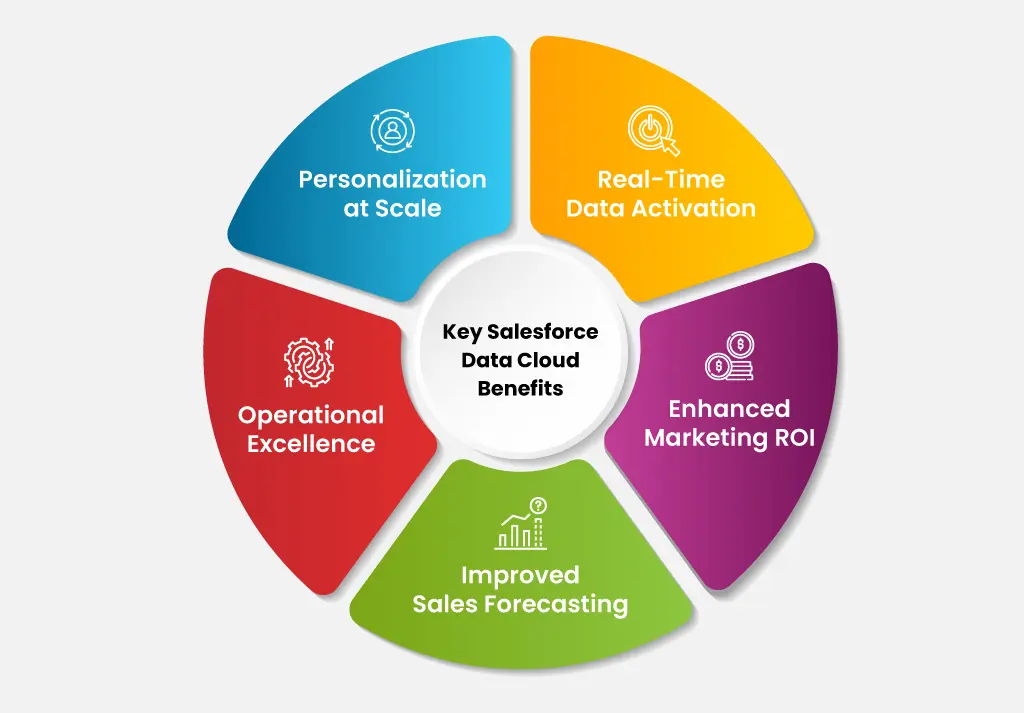
Real-World Salesforce Data Cloud Use Cases
Retail Industry
A leading e-commerce platform integrated Salesforce Data Cloud to analyze customer purchase history and browsing behavior. This enabled personalized product recommendations, resulting in an increase in average order value.
Healthcare Sector
A healthcare provider consolidated patient data from various sources, achieving a unified view of patient interactions. This led to improved patient engagement and adherence to treatment plans.
Financial Services
A financial institution leveraged Salesforce Data Cloud for centralized customer data management, ensuring compliance with regulatory standards and enhancing risk management practices.
Wrap-up
Salesforce Data Cloud stands as a transformative solution for businesses aiming to harness the full potential of their customer data. By facilitating personalized experiences, enhancing operational efficiency, and providing actionable insights, it delivers substantial ROI. As data continues to be a pivotal asset in the digital age, investing in robust platforms like Salesforce Data Cloud becomes imperative for sustained success.
Want to know more on how to see how this ROI strategy fits in your org? Contact our Salesforce experts here and we will guide you through the entire process!
FAQ:
1. What is Salesforce Data Cloud used for?
2. How does Salesforce Data Cloud improve marketing ROI?
3. What are the key benefits of Salesforce Data Cloud?
4. Can Salesforce Data Cloud be integrated with existing Salesforce products?
5. How can businesses measure the ROI of Salesforce Data Cloud?

Nilamani Das
Nilamani is a thought leader who champions the integration of AI, Data, CRM and Trust to craft impactful marketing strategies. He carries 25+ years of expertise in the technology industry with expertise in Go-to-Market Strategy, Marketing, Digital Transformation, Vision Development and Business Innovation.










